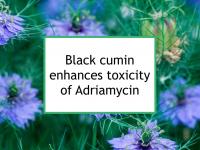Black cumin (Nigella sativa) seeds are used as a spice in Indian and Middle Eastern cooking. Thymoquinone, the major bioactive compound in black cumin seeds, has been found to promote breast cancer programmed cell death. Thymoquinone has also been shown to increases the effectiveness of paclitaxel, docetaxel, doxorubicin and cisplatin.
This is true for animal models of both hormone receptor positive (ER+/PR+) and triple negative (ER-/PR-/HER2-) breast cancer. Thymoquinone also potentiates the cytotoxic effects of tamoxifen in ER+/PR+ breast cancer.
In addition, thymoquinone has been shown to radiosensitize ER+/PR+ breast cancer cells, thereby increasing the treatment effects of radiotherapy. Now a new study has reported that the combination of thymoquinone plus doxorubicin suppresses tumor growth while reducing doxorubicin-induced heart damage (cardiomyopathy) in mice.
Black cumin is a member of the buttercup family and is not related to cumin, which a member of the parsley family. Black cumin is also known as black seed, Roman coriander, fennel flower, nutmeg flower and black caraway.
Hence, it is important to verify that you are purchasing Nigella sativa. Organic black cumin is best since it reduces the likelihood of contamination or admixture of other spices. Black cumin can be ground and used similarly to black pepper in cooking.
Although black cumin seed oil is available as a supplement, we do not recommend it. The safety and effectiveness of this more concentrated source of thymoquinone has not been established. Like other compounds with anti-cancer effects found in food, we favor using thymoquinone at the relatively low dose available in black cumin seeds rather than attempting to obtain pharmacological effects from a higher dose.
Latest research finds black cumin potentiates doxorubicin
The study referenced above was designated to evaluate the role of doxorubicin (doxorubicin) and thymoquinone nanomatrices in potentiating the cytotoxicity of these drugs, alone or in combination. A nanomatrix chemically links two or more components, in this case in F2 gel. F2 gel is a fully-acetylated poly-N-acetyl glucosamine nanofiber which appears to improve the cellular uptake of certain treatments. The authors also sought to determine the ability of thymoquinone to reduce the cardiotoxicity of doxorubicin in solid Ehrlich carcinoma-bearing mice. Ehrlich solid tumor was used as an experimental model for breast cancer in this study.
Doxorubicin and/or thymoquinone were loaded into F2 gel. The study included 80 female albino mice, in most of whom solid Ehrlich carcinoma was induced. The mice were randomly assigned to one of eight groups: (1) control (no tumor); (2) tumor control (tumor bearing without treatment); (3) F2 gel (tumor bearing with F2 gel without any doxorubicin or thymoquinone treatment); (4) free doxorubicin (tumor bearing with conventional doxorubicin treatment); (5) doxorubicin + F2 gel (tumor bearing with F2 loaded with doxorubicin); (6) free thymoquinone (tumor bearing with conventional thymoquinone treatment); (7) thymoquinone + F2 gel (tumor bearing with F2 loaded with thymoquinone); and (8) doxorubicin + thymoquinone + F2 gel (tumor bearing with F2 loaded with both doxorubicin and thymoquinone).
Blood, cardiac and tumor tissue samples were collected when the mice were sacrificed on the 28th day after tumor inoculation. Doxorubicin, thymoquinone, and the combination of doxorubicin + thymoquinone each were found to reduce tumor volume significantly compared to conventional therapies. Cardiac makers, anti-apoptotic protein Bcl-2 and gene expression of the tumor suppressor gene p53 were compared to free conventional therapies. Treatment with doxorubicin + thymoquinone + F2 gel (mouse group 8) was found to be superior to all other groups in producing beneficial effects.
The authors conclude that use of thymoquinone in combination with doxorubicin could improve doxorubicin's cytotoxic effects and limit its cardiac toxicity. In addition, the authors note that loading doxorubicin and/or thymoquinone into F2 gel produces even more heightened anti-cancer activity.
Please see our article on diet during doxorubicin treatment for more information.
